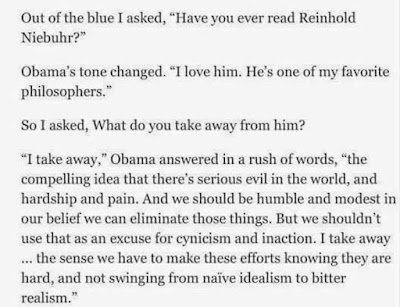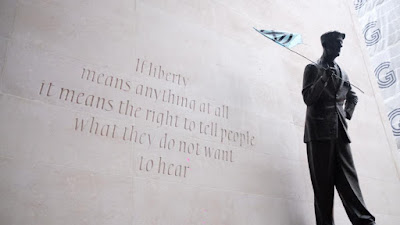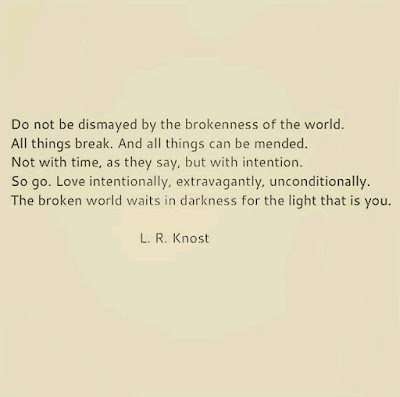The only thing we can truly bequeath to the next generation are Roots and Wings. I hope this blog inspires you to share yours.
1/31/2020
1/30/2020
1/29/2020
1/23/2020
1/20/2020
1/19/2020
1/18/2020
1/15/2020
Three things
I have just three things to teach:
Simplicity, Patience, Compassion.
These three are your greatest treasures.
Simple in actions and thoughts,
you return to the source of being.
Patient with both friends and enemies,
you accord with the way things are.
Compassionate toward yourself,
you reconcile all beings in the world.
~ Tao de Ching (trans. Stephen Mitchell)
1/13/2020
On wholeness
“Helping,
fixing, and serving represent three different ways of seeing life. When
you help, you see life as weak. When you fix, you see life as broken.
When you serve, you see life as whole. When we help we may inadvertently take away from
people more than we could ever give them; we may diminish their
self-esteem, their sense of worth, integrity and wholeness. When I help I
am very aware of my own strength. But we don’t serve with our strength,
we serve with ourselves. We draw from all of our experiences. Our
limitations serve, our wounds serve, even our darkness can serve. The
wholeness in us serves the wholeness in others and the wholeness of
life.”
1/12/2020
1/11/2020
Fromm offers six guidelines for listening
2. Nothing of
importance must be on his mind, he must be optimally free from anxiety as well
as from greed.
3. He must
possess a freely-working imagination which is sufficiently concrete to be
expressed in words.
4. He must be
endowed with a capacity for empathy with another person and strong enough to
feel the experience of the other as if it were his own.
5. The condition
for such empathy is a crucial facet of the capacity for love. To understand
another means to love him — not in the erotic sense but in the sense of
reaching out to him and of overcoming the fear of losing oneself.
6. Understanding
and loving are inseparable. If they are separate, it is a cerebral process and
the door to essential understanding remains closed.
1/10/2020
1/09/2020
1/07/2020
Excerpt from Pema Chodron
Excerpt from Pema Chodron's inspiring little
book:
Practicing Peace in Times of War
"War and peace start in the hearts of
individuals. Strangely enough, even though all beings would like to live in
peace, our method for obtaining peace over the generations seems not to be very
effective: we seek peace and happiness by going to war. This can occur at the
level of our domestic situation, in our relationships with those close to
us. Maybe we come home from work and we’re tired and we just want some
peace; but at home all hell is breaking loose for one reason or
another, and so we start yelling at people. What is our motivation? We
want some happiness and ease and peace, but what we do is get even more
worked up and we get everyone else worked up too. This is a familiar
scenario in our homes, in our workplaces, in our communities, even when we’re
just driving our cars. We’re just driving along and someone cuts in front
of us and then what? Well, we don’t like it, so we roll down the window
and scream at them.
War begins when we harden our hearts, and we
harden them easily—in minor ways and then in quite serious, major ways, such as
hatred and prejudice—whenever we feel uncomfortable. It’s so sad,
really, because our motivation in hardening our hearts is to find some kind of
ease, some kind of freedom from the distress that we’re feeling.
Someone once gave me a poem with a line in it
that offers a good definition of peace: “Softening what is rigid in our
hearts.” We can talk about ending war and we can march for ending war, we can
do everything in our power, but war is never going to end as long as our hearts
are hardened against each other.
What happens is a chain reaction, and I’d be
surprised if you didn’t know what I’m talking about. Something occurs—it can be
as small as a mosquito buzzing—and you tighten. If it’s more than a mosquito—or
maybe a mosquito is enough for you—something starts to shut down in you, and
the next thing you know, imperceptibly the chain reaction of misery begins: we
begin to fan the grievance with our thoughts. These thoughts become the fuel
that ignites war. War could be that you smash that little teensy-weensy
mosquito. But I’m also talking about war within the family, war at the office,
war on the streets, and also war between nations, war in the world.
Subscribe to:
Posts (Atom)

















































